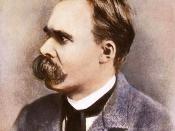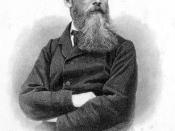In the third chapter of "Beyond Good and Evil", Nietzsche discusses ideas of today's society being mainly atheistic, although still religious. God is no longer thought of as a father, a rewarder or a judge, and is no longer "listening". However there is still a religious spirit which has evolved beyond theism. Nietzsche also speaks of how the spirit of sacrifice for religion has been refined through time: at first we would sacrifice our loved ones for religion, and then we moved on to sacrifice ourselves to God instead, including our freedom and our strength. From this the only thing left to sacrifice was God himself and we now worship nothing. Nietzsche's declaration of the "death of God" in another of his books shows the abandonment of our culture to commitment to the Christian faith, which is also partly due to the fact that less leisure time makes it harder to be a true Christian.
Underlying these sections of the book is an idea about "master morality" and "slave morality", where those who were healthy, strong and free were "good" and the weak and poor were seen as "bad". This idea was reversed when those less well off came to see those in higher positions as "evil". Nietzsche believes that religion has taught us to be content in weakness rather than try to become strong. It seems that Nietzsche is also suggesting that those who have no power in this life will believe, because of religion, that they will have power in another life. We have invented religion as a way of explaining our sense of being defeated in life. Nietzsche here has explained and accounted for how religion has created this false order and it is clear to see that he has other ideas of what...


